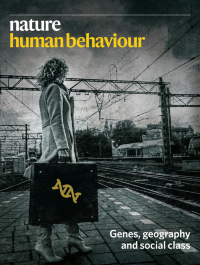Volume 3
-
No. 12 December 2019
Genes, geography and social classThere are large regional inequalities in wealth and educational attainment within Great Britain. New research shows that these regional inequalities have a genetic component that is becoming stronger over time.
See Abdellaoui et al.
-
No. 11 November 2019
Memory in agingWhat determines the fate of our memory in aging? A study in this issue shows that older adults with preserved integrity of the brain’s norepinephrine supply, the locus coeruleus, are equipped with more proficient episodic memory.
See Dahl et al.
See also Jacobs
-
No. 10 October 2019
Publish or perish for PhD students?Regardless of country or discipline, publications are an expectation—if not a requirement—to obtain a PhD. In this issue, PhD students, academics and external stakeholders describe how this imposes detrimental consequences but also provides benefits for individuals and the scientific community, including clear calls for future improvements. The discussion is amplified with more contributions on our community forum.
See Focus on PhDs under publication pressure See also Behavioural & Social Sciences at Nature Research
-
No. 9 September 2019
Guns, mass shootings and the mediaThe United States is experiencing mass shooting events with alarming frequency. Porfiri et al. show that over the past 20 years, there has been an association between the occurrence of a mass shooting and the rate of growth in firearm acquisition. This association is partly driven by media coverage, which likely increases public worry about more stringent firearms control, leading to more gun purchases.
See Porfiri et al.
-
No. 8 August 2019
Understanding substitution dynamicsA considerable number of ideas, products and behaviours spread by substitution (replacing one item for another), but very little is known about diffusion in substitutive systems. Jin et al. find that early growth patterns in substitutive systems are different than in non-substitutive systems: they follow power laws rather than exponentials.
See Jin et al.
-
No. 7 July 2019
Imprisonment and future violenceUsing data from Michigan, Harding et al. find no credible evidence that prison sentences have an effect on arrests or convictions for violent crimes after release. Imprisonment modestly reduced violence if the analysis included imprisonment’s incapacitation effects.
See: Harding et al.
-
No. 6 June 2019
Profiling Old English poetryThe corpus of Old English poetry is sparse and fragmented, making its study challenging. Neidorf et al. analyse the whole corpus quantitatively, providing answers to two longstanding questions of English literary history: most likely, a single author composed Beowulf and the anonymous poem Andreas was written by Cynewulf.
See Neidorf et al.
-
No. 5 May 2019
The genetics of smoking in the JapaneseSmoking is a risk factor for several diseases, but what we know about the genetic architecture of smoking behaviours comes primarily from individuals of European ancestry. Matoba et al. examine genetic components of smoking behaviours in the Japanese population, identifying seven loci not previously identified in European samples and 11 diseases that share genetic bases with smoking behaviours in the Japanese.
See Matoba et al.
-
No. 4 April 2019
Left brain, right brainWhich side of the brain does what in speech and language processing? Flinker and colleagues develop a framework for auditory cortical asymmetries that capitalizes on spectrotemporal modulation space.
See Flinker et al. See also Hamilton
-
No. 3 March 2019
Air pollution and well-beingDoes air pollution contribute to the urban population’s low levels of happiness in China? By constructing a ‘happiness index’ from Sina Weibo data for 144 Chinese cities, Zheng et al. find that high levels of air pollution significantly reduce Chinese urbanites’ expressed happiness on social media.
See Zheng et al.
-
No. 2 February 2019
Collective knowledge formationAn analysis of all Wikimedia projects in all languages reveals deep structural inequality: a small number of editors have a disproportionately large influence on the formation of collective knowledge.
See Yun et al.
-
No. 1 January 2019
Neurofeedback for soldiersImproving emotional regulation is a critical skill in response to stress. A study in this issue shows that soldiers in combat training who undergo electroencephalography-based neurofeedback training of amygdala activity improve their ability to regulate emotion, a skill that may protect them from future psychiatric disorders.
See Keynan et al. See also News and Views by Young.












